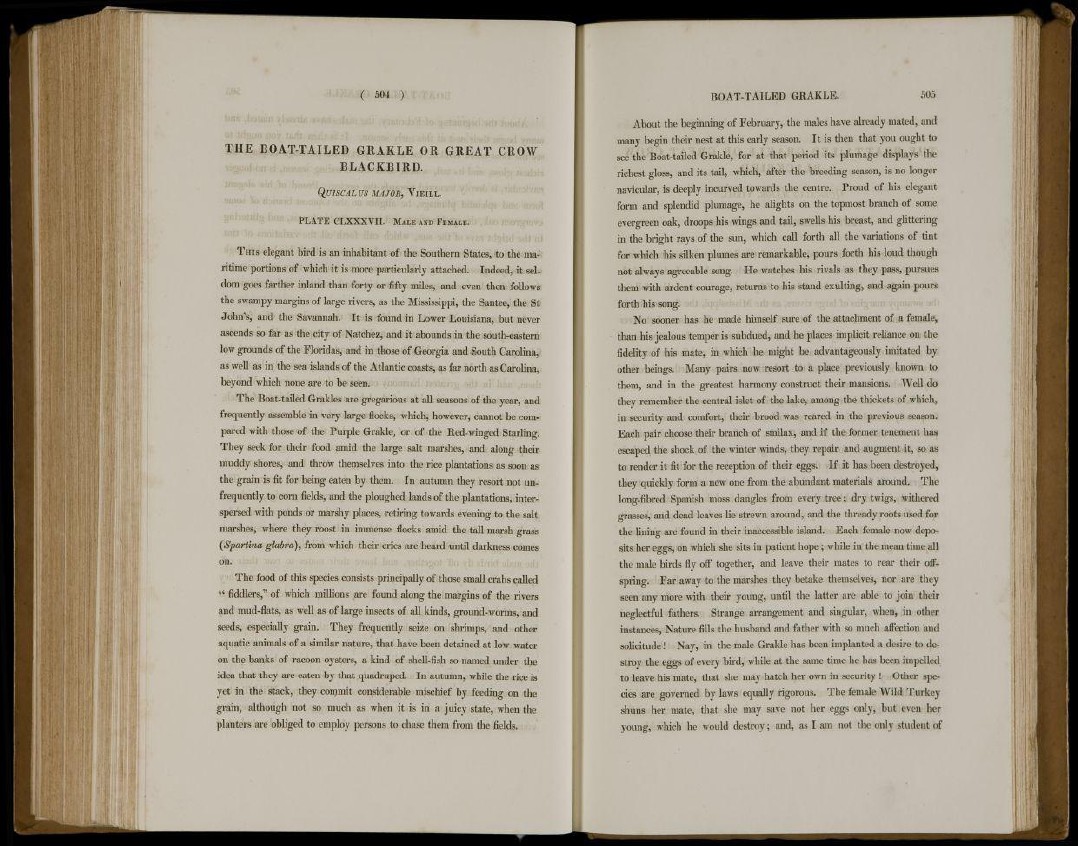
( *04 )
T H E BOAT-TAILED GRAKLE OR GREAT CROW
BLACKBIRD.
QUISCALUS MAJOR, VlEILL.
P L A T E C L X X X V I I . MALE AND FEMALE.
THIS elegant bird is an inhabitant of the Southern States, to the maritime
portions of which it is more particularly attached. Indeed, it seldom
goes farther inland than forty or fifty miles, and even then follows
the swampy margins of large rivers, as the Mississippi, the Santee, the St
John's, and the Savannah. It is found in Lower Louisiana, but never
ascends so far as the city of Natchez, and it abounds in the south-eastern
low grounds of the Florid as, and in those of Georgia and South Carolina,
as well as in the sea islands of the Atlantic coasts, as far north as Carolina,
beyond which none are to be seen.
The Boat-tailed Grakles are gregarious at all seasons of the year, and
frequently assemble in very large flocks, which, however, cannot be compared
with those of the Purple Grakle, or of the Red-winged Starling.
They seek for their food amid the large salt marshes, and along their
muddy shores, and throw themselves into the rice plantations as soon as
the grain is fit for being eaten by them. In autumn they resort not unfrequently
to corn fields, and the ploughed lands of the plantations, interspersed
with ponds or marshy places, retiring towards evening to the salt
marshes, where they roost in immense flocks amid the tall marsh grass
(Spartina glabra), from which their cries are heard until darkness comes
on.
The food of this species consists principally of those small crabs called
" fiddlers," of which millions are found along the margins of the rivers
and mud-flats, as well as of large insects of all kinds, ground-worms, and
seeds, especially grain. They frequently seize on shrimps, and other
aquatic animals of a similar nature, that have been detained at low water
on the banks of racoon oysters, a kind of shell-fish so named under the
idea that they are eaten by that quadruped. In autumn, while the rice is
yet in the stack, they commit considerable mischief by feeding on the
grain, although not so much as when it is in a juicy state, when the
planters are obliged to employ persons to chase them from the fields.
BOAT-TAILED GRAKLE. 5 0 5
About the beginning of February, the males have already mated, and
many begin their nest at this early season. It is then that you ought to
see the Boat-tailed Grakle, for at that period its plumage displays the
richest gloss, and its tail, which, after the breeding season, is no longer
navicular, is deeply incurved towards the centre. Proud of his elegant
form and splendid plumage, he alights on the topmost branch of some
evergreen oak, droops his wings and tail, swells his breast, and glittering
in the bright rays of the sun, which call forth all the variations of tint
for which his silken plumes are remarkable, pours forth his loud though
not always agreeable song. He watches his rivals as they pass, pursues
them with ardent courage, returns to his stand exulting, and again pours
forth his song.
No sooner has he made himself sure of the attachment of a female,
than his jealous temper is subdued, and he places implicit reliance on the
fidelity of his mate, in which he might be advantageously imitated by
other beings. Many pairs now resort to a place previously known to
them, and in the greatest harmony construct their mansions. Well do
they remember the central islet of the lake, among the thickets of which,
in security and comfort, their brood was reared in the previous season.
Each pair choose their branch of smilax, and if the former tenement has
escaped the shock of the winter winds, they repair and augment it, so as
to render it fit for the reception of their eggs. If it has been destroyed,
they quickly form a new one from the abundant materials around. The
long-fibred Spanish moss dangles from every tree; dry twigs, withered
grasses, and dead leaves lie strewn around, and the thready roots used for
the lining are found in their inaccessible island. Each female now deposits
her eggs, on which she sits in patient hope ; while in the mean time all
the male birds fly off together, and leave their mates to rear their offspring.
Far away to the marshes they betake themselves, nor are they
seen any more with their young, until the latter are able to join their
neglectful fathers. Strange arrangement and singular, when, in other
instances, Nature fills the husband and father with so much affection and
solicitude! Nay, in the male Grakle has been implanted a desire to destroy
the eggs of every bird, while at the same time he has been impelled
to leave his mate, that she may hatch her own in security ! Other species
are governed by laws equally rigorous. The female Wild Turkey
shuns her mate, that she may save not her eggs only, but even her
young, which he woidd destroy; and, as I am not the only student of